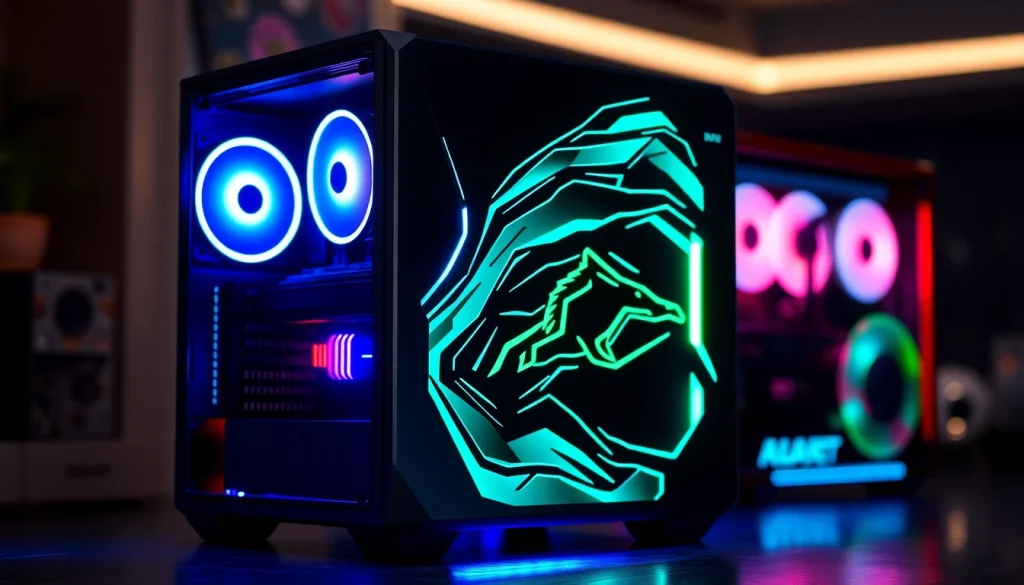
Understanding Custom Gaming PC Cases
In recent years, the trend of customizing gaming setups has gained significant momentum, particularly in the realm of gaming PC cases. A custom gaming pc case allows gamers to create a personal touch that reflects their individuality and ensures optimal performance tailored to their specific needs. However, the intricacies of designing and selecting a case go beyond just aesthetics. In this guide, we’ll delve deep into what makes a gaming PC case custom, explore different types available in the market, and provide thorough insights into how to choose and design the right case for your gaming needs.
What Makes a Gaming PC Case Custom?
A custom gaming PC case is defined by the level of personalization it offers. This customization can manifest in various forms, including the shape, size, materials, color schemes, and additional features like lighting or cooling systems. Unlike mass-produced cases that are generic and uniform, custom cases empower users to make choices that fit their personal style and performance requirements.
Many factors contribute to the custom nature of a gaming PC case:
- Design Aesthetics: This includes color, finish, and the structural design that might cling to a specific theme, such as futuristic looks or a retro vibe.
- Functional Features: Integration of specialized cooling systems, cable management options, and modular designs fall under this category.
- Material Selection: Custom cases can be constructed from various materials including metal, acrylic, tempered glass, and even wood, allowing for a wide variety of textures and visibility options.
- Personalization Options: The ability to engrave logos, use printed panels, or attach custom decals adds a unique touch that resonates with the builder’s identity.
The Importance of Aesthetics and Functionality
The aesthetic appeal of a gaming PC case is what first catches the eye. Gamers are often looking for a piece that not only houses their components but also enhances their gaming environment. A well-designed case can serve as a focal point in a gaming setup, showcasing RGB lighting, intricate designs, and branded elements.
However, aesthetics should not overshadow functionality. A great gaming PC case serves its purpose efficiently, facilitating adequate airflow, easy cable management, and expansion opportunities for future upgrades. Balancing these two aspects is critical in ensuring both visual satisfaction and practical performance.
Key Features to Consider in Your Design
When delving into the design process of a custom gaming PC case, it’s vital to consider several key features that will enhance the performance and appeal of the build:
- Airflow and Cooling: Adequate airflow is essential to keep components running efficiently. Designs that support multiple fan installations or have features for liquid cooling are highly desirable.
- Size: The case size should align with the motherboard type (ATX, Micro-ATX, Mini-ITX), allowing compatibility while maximizing internal space.
- Expansion Slots: The number of slots will determine future upgrades, affecting graphics cards, storage drives, and other peripherals.
- Accessibility: Features that allow for easy access to components are invaluable, especially during maintenance or upgrades.
- Cable Management: An effective system for organizing cables can greatly enhance the look within the case and promote better airflow.
Popular Types of Custom Gaming PC Cases
The market offers a varied selection of custom gaming PC cases, each catering to different preferences and requirements. Understanding these can help you make an informed decision.
ATX vs ITX: Which One is Right for You?
The choice between ATX and ITX cases depends largely on your specific needs for gaming performance versus compactness.
ATX Cases: These larger cases offer ample space for components, improved airflow, and a more significant number of expansion slots, making them a preferred choice for high-performance builds and gamers who demand extensive cooling options.
ITX Cases: On the other hand, ITX cases cater to those who prefer small form factors. They’re ideal for building compact PCs that can fit into tight spaces without compromising on aesthetics. However, they generally have limited expansion options and may require careful planning regarding component selection.
Unique Shapes and Sizes to Enhance Your Build
Beyond standard shapes, some custom gaming PC cases feature unique designs that can enhance the overall gaming experience.
Cases like the “Cube” design offer a different aesthetic while retaining functional attributes, often allowing for greater airflow. Similarly, open-frame cases provide an industrial look while showcasing internal components.
Dimensions also play a significant role; while some gamers may prefer taller cases for better cooling solutions, others may go for wider cases to accommodate expansive setups with multiple GPUs.
Exploring Popular Materials and Finishes
The choice of materials and finishes will have a significant impact on both the appearance and functionality of a gaming PC case.
Metal: Frequently used for its durability and classic look, metal cases can offer excellent protection while allowing for sleek designs.
Acrylic and Tempered Glass: These materials are popular for their aesthetic appeal, providing clear visibility into the case and allowing for light displays. However, care must be taken as they can be more prone to scratches and cracks.
Wood: A more recent trend is the use of wood in PC case designs, providing a unique, warm aesthetic while contrasting the high-tech components.
How to Choose the Right Custom Gaming PC Case
Choosing the right case is a pivotal step in the custom gaming PC build process. Here’s a detailed guide on how to make an informed selection.
Assessing Cooling Options for Optimal Performance
Cooling is crucial for maintaining performance during long gaming sessions. Evaluate the cooling options available in a case, focusing on:
- Fan Mounts: Ensure the case has space for multiple fans and supports larger sizes for enhanced airflow.
- Radiator Support: If considering liquid cooling, check for appropriate radiator mounts.
- Airflow Design: Look for cases with mesh fronts or unique airflow designs that facilitate better cooling efficiency.
Space and Layout Considerations
Before finalizing your case, measure your components and layout:
- Dimensions: Ensure there’s adequate space for the CPU cooler, graphics card, and power supply within the case.
- Airflow Path: Plan how air will flow through the case—this can contribute to better cooling efficiency.
- Cable Management: Look for features like rubber grommets and tunnel designs that will make it easier to route cables neatly.
Budgeting for Your Custom Build
Financial planning is essential in the pursuit of the perfect custom gaming PC case. Set a budget that allows for quality components while considering the following elements:
- Base Price of the Case: Research various options within your budget range that meet your needs.
- Additional Costs: Factor in potential costs for modifications, custom panels, and other aesthetic enhancements.
- Future Upgrades: Choose a case that offers room for upgrades, which may save you costs down the line.
Designing Your Custom Gaming PC Case
The design phase is where your vision takes shape. Here’s how to incorporate personal elements into your PC case:
Incorporating Personal Elements and Themes
Infusing personal elements into the design allows your case to be a true representation of your gaming persona:
- Color Schemes: Choose colors that resonate with your gaming style or favorite games.
- Thematic Elements: Some gamers base their designs on their favorite games, characters, or franchises.
- Lighting Effects: Utilize RGB lighting and customization options to enhance visual impact.
Utilizing PC Case Modding Techniques
Modding can elevate a standard case to something truly unique. Consider techniques like:
- Painting and Vinyl Wrapping: Change the exterior colors or add graphics to customize the look.
- Custom Panels: Use laser-cut or printed panels to include personal designs.
- Custom Cooling Solutions: Experiment with innovative cooling methods that add to the visual appeal.
Leveraging Online Tools and Resources
Many online resources and tools can help you visualize your custom PC case:
- PC Building Simulators: Tools like PCBuildingSimulator allow you to virtually assemble your components and choose cases.
- Design Platforms: Websites often provide tools for designing and visualizing modded case designs.
- Community Forums: Browse forums and social media groups for inspiration and tips from fellow PC builders.
Conclusion: Elevate Your Gaming Experience with a Custom Case
Designing and building a custom gaming PC case is a journey in self-expression and creativity. Not only does it allow you to showcase your unique style, but it also enhances your gaming experience through optimized performance and functionality.
Showcasing Your Unique Style
There’s nothing quite like revealing your custom-built PC setup to friends and fellow gamers. It stands as a testament to your individuality and passion for gaming. When designed thoughtfully, it can evoke a sense of pride, acting as an extension of your personality.
Building for Performance and Longevity
The experience of gaming is always evolving, and your custom gaming PC case should too. Constructing a build with both aesthetics and performance in mind ensures that it will endure through the years. By choosing quality materials and focusing on functionality, you’ll create a PC that not only looks good but can handle the demands of future gaming titles.
Future Trends in Custom Gaming PC Case Design
As technology changes, so too do aesthetics and functionalities in gaming PC cases. Future trends might include more sustainable materials, hybrid designs incorporating necessary technology for RGB integration and cooling, and greater flexibility in size and shape to suit the ever-evolving needs of gamers. Keeping an eye on these trends allows you to stay ahead in the customization game.




